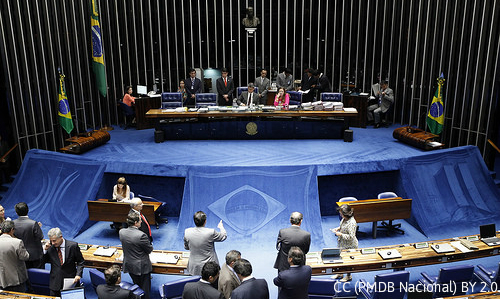Personal data: awaiting a text
by Digital Rights LAC on May 5, 2014
Very few people remember this, but in 2010 Brazil began the process of creating a specific law for the protection of personal data. Part of this lack of awareness can be attributed to the federal government itself, which for a long time stalled the initiative to create a new legal text, but it can also be due to the fact that our culture is permissive of the evasion of personal information. But the maturing of the Marco Civil da Internet into a law opens the door for privacy to occupy a central role in the country’s digital politics agenda.
By Paulo Rená da Silva Santarém
Between November 2010 and April 2011, a partnership between the Ministry of Justice and the Getulio Vargas Foundation in Rio de Janeiro generated a public debate on privacy and the protection of personal data. In five months, 14 thousand visits and 795 comments were received. However, all of this discussion was not enough to guarantee the presentation of a draft of a law by the Executive Branch.
The federal government only readdressed the issue in 2013, when Edward Snowden reported the mass surveillance on the Internet by the American National Security Agency in association with similar agencies from four other countries (Australia, Canada, New Zealand and the United Kingdom). In spite of this, this new approach merely proposed changes to be made to the Marco Civil text, as this was being analysed by parliament since August 2011. Even the proposed alterations – such as the initial demand of data centres in the country and the enforced obligation of retention of data and access to the protection of privacy – were not proven to be exactly adequate for the protection of privacy.
Certainly the Brazilian government’s disinterest in continuing this discussion is related to the lack of public sensitivity to the issue of preserving personal data. It’s surprising to consider the vast amount of information, which is supplied in order to access any service, public or private, or even to acquire products. From the Natural Persons Register number (CPF) presented by shoppers in for tax exemptions, to giving your personal address to participate in a promotional television campaign, in Brazil personal information is easily obtained by any company.
This context generates a series of risks, exacerbated by the growing demand for the supply of an ever-greater amount of data. From a public security perspective, retention as a rule and the State’s access to data are deemed necessary to enable criminal investigations, specifically in the digital field; in the market’s logic, consumer profiles are real assets which can easily be converted into money by way of directed marketing; in the logic of the entertainment world, big data allows consumers the comfort of a more personalized experience. This leaves little room to consider the issue of the right to a private life.
Without a public political debate, open to participation and subject to broad social scrutiny, currently the decisions concerning the protection of privacy are made according to private interests. This is very problematic, as oftentimes the market’s priorities do not align themselves with the protection of rights. The government itself, unless legal limits to its activity are established, can play the role of a tyrant when it comes to the treatment of personal information of its internal and external adversaries.
It’s always important to emphasize that we are not just discussing the Internet. Firstly, me must also consider credit cards, cell phones, MP3 players, movement-controlled video games and even cars and smart-TVs: any personal device which contains digital information. Secondly, surveillance cameras, electronic turnstiles, biometric identification and records tied to the Natural Persons Register. There is a growing number of means of building a complete map of anyone’s life.
Privacy, in more ample terms, can be seen as the right to determine, for oneself, the line that separates the public from the private part of our lives. This is a free and individual choice, in accordance with one’s personal convictions and way of seeing the world. A guarantee that each person can have a private life, in terms of what each person wants. Furthermore: without any tax on this choice, and with the assurance that it will not be disrespected.
But of course real life does not follow the logic of the law. Individually, only a few violations of privacy are worth the effort, time and money required to seek a judicial solution and restitution. In the public sector, the existing international web surveillance is good example of a very strong political component. However, in a complex society, which involves politics, economics, religion, science, entertainment and even convenience, the time will come in which the need to determine limits of right and wrong, in terms of what’s legal and illegal, will become necessary.
The creation process of the Marco Civil and its maturing broadened the concept of what is necessary to assure peoples’ privacy, within the Internet and outside of it. This context has proven to be ideal for the federal government to resume the debate on privacy, ultimately seeking to achieve an objective implementation of an express command from the Federal Constitution, which in turn reflects existing North-American and international rules. Even though it’s late to the debate, Brazil can still arguably assume a protagonist role in this. Or at least reach the level of its Latin-American neighbours, who already have a set of rules assuring the minimum provision of personal data.






